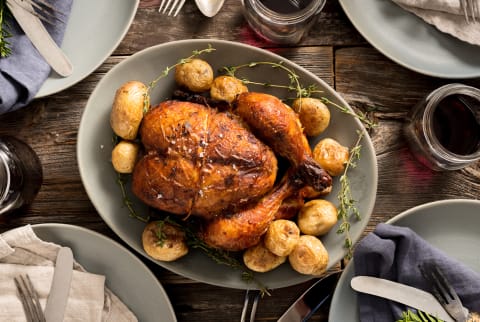Advertisement
The Underrated Reason You Actually Should Leave The Skin On Your Chicken



There are tons of foods that can help support and boost your natural collagen production (feel free to check out our list here), including a gorgeous mix of fruits and veggies. But in terms of delivering actual collagen to your cells (rather than using antioxidants to protect the collagen you have from oxidative stress wear and tear), well, you're looking at beef, chicken, or fish—you could also supplement with hydrolyzed collagen peptides.* These targeted products source collagen from the aforementioned animal trio as well. After all, collagen is not vegan, and believing otherwise is a big mistake.
Another common mistake, it turns out, has to do with your poultry intake: To increase their dietary collagen, many people opt for boneless, skinless chicken breasts and call it a day. A major no: You should leave the skin on for its collagen-boosting benefits.
Why you should leave the skin on your chicken.
Chicken skin is a good source of high-quality collagen1, according to research. To break it down into specifics, the skin contains2 around 55% water, 35% connective tissue (mostly collagen), around 5 to 10% fat, and 0.5% ash (depending on how you cook it). Don't worry, "ash" means minerals (nutrients).
And let's not forget, collagen helps make up the structure of our own skin—we actually make our own supply via our cells' fibroblasts (although, our natural levels decrease with age), so it makes sense you'd find an abundance in animal skin as well.
Tendons and ligaments are also very high in that connective tissue; in fact, one study used chicken cartilage as a collagen source to help with joint comfort3.* Another study found that women who took collagen supplements made from chicken cartilage saw major improvements in aging skin4, including reducing fine lines and wrinkles.*
This chicken anatomy lesson has a point (so stay with us, here): If you're eating boneless, skinless chicken breasts, you're not consuming that collagen-rich cartilage. They're still a good source of protein in their own right, no hate against chicken breasts, but if you are hoping to reap the benefits of collagen, don't omit the best part of the equation. Finally, no matter how you prepare your bird, organic, pasture-raised chicken is the way to go, if it's accessible to you.
The takeaway.
Plenty of foods can help support your collagen production—just make sure you're not unknowingly tossing the richest source. With chicken, keeping the skin on can give you even more of a collagen boost.
4 Sources
- https://pubmed.ncbi.nlm.nih.gov/12705413/
- https://www.sciencedirect.com/topics/agricultural-and-biological-sciences/chicken-skin#:~:text=Pork%20or%20chicken%20skin%20contains,%25%20fat%20and%200.5%25%20ash.&text=Tendons%20or%20ligaments%20are%20also,connective%20tissue%20and%20therefore%20collagen.
- https://www.ncbi.nlm.nih.gov/pmc/articles/PMC3426261/
- https://pubmed.ncbi.nlm.nih.gov/31221944/
